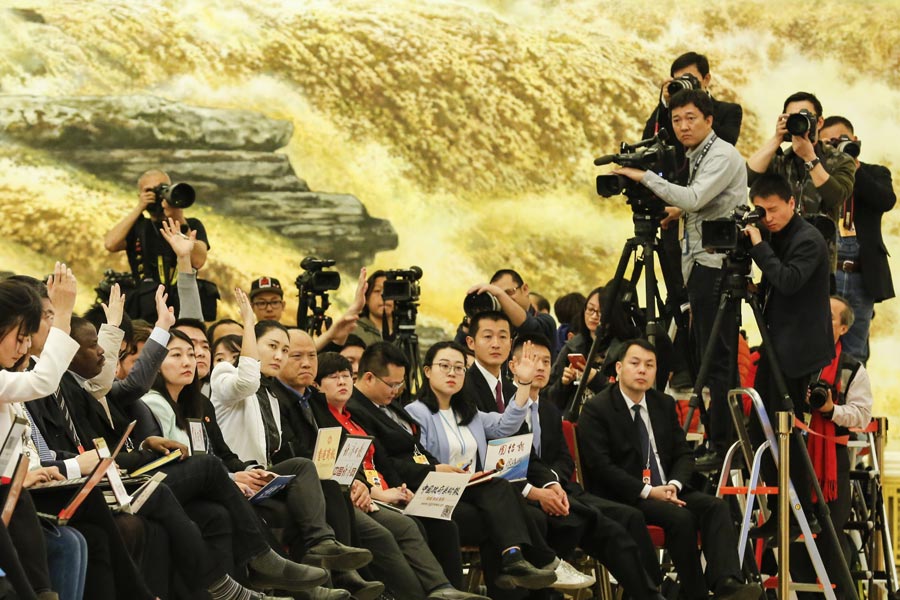Premier Li Keqiang meets the media after the NPC's annual session closes


At the Great Hall of the People, journalists from around the world asked questions on economic growth, the Korean Peninsula, relations with the United States and Russia
Premier Li Keqiang met with Chinese and foreign reporters and answered their questions at a news conference held at the Great Hall of the People after the conclusion of the first session of the 13th National People's Congress on Tuesday. The following is a transcript of the news conference:
Premier Li Keqiang: Members of the media, ladies and gentlemen, let me begin by expressing my high appreciation to all of you for your hard work in covering the NPC and CPPCC sessions. Before taking your questions, let me present to you the newly appointed vice-premiers. They are Vice-Premier Han Zheng, Vice-Premier Sun Chunlan, Vice-Premier Hu Chunhua and Vice-Premier Liu He. Now the floor is open for questions.
Bloomberg: This year is the 40th anniversary of China's reform and opening-up. Over those 40 years, China has enjoyed unprecedented economic growth and hundreds of millions of people have been pulled out of poverty. But it's becoming increasingly clear that China is entering a new era, where problems are going to become more complicated and the model of reform and opening is also changing, highlighted by the restructuring of the government departments and the revisions of the Constitution that were passed by the National People's Congress this year. I wanted to ask you what will the biggest difference be between reform and opening in this new era versus the past, especially when it comes to foreign investment and trade?
Premier Li: Opening-up has been instrumental to China's economic and social transformation in the past 40 years. It has driven China's reform agenda, promoted its development and delivered real benefits to the Chinese people. In his speech at the World Economic Forum meeting in Davos last year, President Xi Jinping made it clear that China will continue to uphold free trade and pursue opening-up as a fundamental policy. If there's anything that's going to be different from the past, it will be that China will open even wider to the world. With its economy so integrated into the global economy, closing China's door will only hinder our own progress. China will continue to open up; indeed, there is still broad space to do so. China's import tariffs are at the medium level internationally. We are committed to bringing them down still further, particularly for high-demand consumer goods. For instance, we aim to adopt zero tariff for the much needed anti-cancer drugs.
On the other hand, China runs a deficit in trade in services. Further opening of the services sector will entail a cost, but it will make the sector more competitive. We plan to widen access to elderly care, healthcare, education and financial services. We will ease or lift the cap on foreign ownership in some sectors. We will also make the manufacturing sector fully open. There will be no mandatory requirement for technology transfer, and intellectual property rights will be better protected.
The negative list for inbound investment will be shortened in the course of this year and the coming years. We aim to merge the three laws governing foreign investment into one law, and fully honor our commitment to foreign investors of pre-establishment national treatment.
As for your question about how the constitutional amendment and institutional reform is going to impact China's opening-up, now that the constitutional amendment and government institutional reforms have been adopted at the NPC session, we will faithfully observe the amended Constitution and follow through on institutional reform. This will reinforce our commitment to the fundamental policy of opening-up.
I can see from some media reports that opinions are divided on market openness in China. Let me make this clear. Our goal is to gradually create a level playing field in a market of 1.3 billion consumers for both Chinese and foreign-invested enterprises of all types of ownership. This will provide Chinese consumers with more options and incentivize the upgrading of Chinese products and services and that of the overall economy.
This said, China's opening-up will be an incremental process. In retrospect, a modest step of opening-up may sometimes yield enormous benefits. For example, five years ago we simplified the procedure for getting passports and traveling overseas. As a result, the number of outbound trips made by Chinese citizens surged from 70 million to 130 million last year, most of them being tourists and shoppers. In making sense of China's opening-up, one needs to pay attention to the concrete steps in specific areas, but more importantly take a panoramic and long-term view. I also want to emphasize that opening needs to work both ways. It's like rowing a boat: if only one of the two oarspeople is giving it their best, the boat will just keep turning on the spot. They'll only move forward if both are working in the same direction.
China Daily: During this year's two sessions, some delegates expressed the view that the Chinese government should pursue the reform of its own functions with the same determination as in pursuing GDP growth in the past. At the same time, we have also heard some complaints suggesting that the government-imposed transaction cost in China remains high, and it is still difficult for the people to get things done. So I would like to ask you, Mr Premier, what more steps will the new government take to streamline administration and delegate powers? And what will the government do to enhance compliance oversight? Are there any specific goals in this area?
Premier Li: You asked a very important question. The transformation of government functions was high on the agenda during our first term. We saw the effort to streamline administration, delegate powers, and improve compliance oversight and government services as pivotal to getting the relationship between the government and the market right, which will further stimulate market vitality and public creativity. I'm happy to say that our efforts have paid off, and these measures have become an effective means for further reforming government functions and for unleashing and developing the productive forces.
In my discussions with them during this year's two sessions, many delegates raised the hope that in pursuing supply-side structural reforms, the government will focus more on improving the business environment and making things easier for people to get things done. These voices represent the high expectation of market entities and our people for further actions. The issues they raise may seem small, yet they bear on major policy decisions. We must heed this call by tackling the root of the problems and pushing for breakthroughs in areas most closely related to the market and to the lives of our citizens to better respond to their needs.
As we say in Chinese, every single detail counts in the accomplishment of big tasks. Going forward, these are the six things we plan to do. We'll cut the time it takes for opening a business by another half; we will reduce the time required for reviewing a project application by another half; we will put in place, at the national level, an e-platform for accessing government services; we will work to see that our people can get things done in one office, without the need for a second trip; and we will ensure that any requirement for certification that has no basis in law or regulations will be abolished.
Thanks to efforts in recent years, we have significantly cut the time required for opening a business in our country. But it still takes 22 days on national average, whereas it takes maybe less than a day in a developed country. And it takes even longer for one to get a project permit in China. So with regulatory streamlining and further tax and fee cuts, we are making profound adjustments to government functions. This is like moving the government's own cheese.
Any regulatory streamlining can only serve its purpose when supported with enhanced compliance oversight, which helps to enforce market order. All acts of malpractice involving cheating in the marketplace, making or selling fake or substandard goods, or running unlawful monopolies, will be dealt with in strict accordance with the law and banned from the market, as they are the enemy of fairness and innovation and go against social ethics.
We believe that a vibrant market and care for the people should go hand in hand. Compliance oversight should not cause undue inconveniences to average citizens. In this round of government institutional reform, for example, we have decided to merge the various market regulatory bodies in order to slim down the bloated ranks of officials who deal with market entities on a daily basis and exercise unified law enforcement.
The first reporter who asked a question mentioned this round of government institutional reform. One part of it is to combine the state and local tax offices at and below the provincial level. This actually reminds me of a recent discussion I had with a group of scholars. One of these experts had been doing some local research, and discovered that if you sit and eat in a restaurant, the local tax office collects business tax. But if you order takeaway, the state tax office collects VAT. So he asked a tax officer: what if I stand and eat in the doorway of the restaurant? Who collects the tax then? The officer replied, "That's just nitpicking for the sake of it." But actually it's true that this kind of problem exists.
In recent years as you may know, we have introduced the reform to replace business tax with value added tax. This has enabled the sharing of tax revenues and provided the foundation for the merging of tax authorities at the central and local levels to avoid duplications that burden businesses. So all in all, our regulatory rollback and compliance oversight will contribute to a more energized market and the creation of a level playing field. I should also add that vested interests will be dealt with in the enhanced compliance oversight process.
Nothing is too small for us to do if it delivers concrete benefits to our people. The ultimate purpose of all reform measures and endeavors of the government is to serve the common good, be results-oriented, and benefit the people. In this regard, the government will further reform itself to foster a better business environment for market players, and make it easier for our people to access government services. In doing so, this government will rise up to all challenges and press ahead against all odds.
Yonhap News: There have been significant developments on the Korean Peninsula recently, with an inter-Korean summit planned for next month, the Democratic People's Republic of Korea indicating willingness to denuclearize, and the US president agreeing to meet with the DPRK leader. Under such circumstances, I would like to ask, Mr Premier, what does China expect from the settlement of the Korean nuclear issue and what role is China prepared to play to this end? Will China push forward the Six-Party Talks to resolve the nuclear issue?
Premier Li: We welcome the recent de-escalation of tensions on the Korean Peninsula. China supports all efforts that are conducive to the resolution of the Korean nuclear issue through dialogue and negotiation. China will continue to do all it can to take forward the denuclearization process and uphold peace and stability on the Korean Peninsula. We hope that all parties will show sincerity and take concrete actions to get the nuclear issue back to the track of negotiation and strive for new progress toward denuclearization and peace and stability on the Korean Peninsula. We believe this serves the interests of all parties and the world at large.
The Korean Peninsula is in China's close neighborhood. China's own interests are at stake. So you can well imagine how concerned we are with the situation there.
CCTV: Concerned about the safety of their property, some private businesspeople are reluctant to make new investments. Some are even trying to transfer their assets overseas. We have also heard complaints from private businesses about the inaction or arbitrary behaviors on the part of some government officials. Premier Li, what will your government do to resolve this problem?
Premier Li: Since reform and opening-up, we have remained committed to unswervingly consolidating and developing the public sector and unswervingly supporting and developing the nonpublic sector. It is fair to say that businesses of all types of ownership, private as well as State-owned, have made important contributions to the historic progress of the Chinese economy in the past few decades. Nowadays, private businesses account for about half of the tax revenues. They also contribute 80 percent to employment and create 90 percent of new urban jobs. It's true that private investment has been less than robust due to weak protection of property rights and some other factors. We are paying high attention to addressing this problem.
Property rights are the cornerstone of our socialist market economy. Protecting lawful property rights is like nurturing the productive forces. Hence it has been a high-priority item on the government agenda, and every effort has been made to tackle the problems our people have encountered in this area. For example, at last year's news conference I was asked about the potential effect of the expiration of land use rights for residential homes. I responded by pledging automatic renewal of the rights and the protection of all such transactions. I also called for amending the relevant law to reflect this policy. Since then, we have also reaffirmed the extension of the current rural land contracts by another 30 years. These are examples of our efforts to protect property rights through means of law, which is a good indication of our commitment to the rule of law.
Let me emphasize that contracts must be honored and not treated as scrap paper. Continuity is essential to good governance. New officials must not be allowed to disavow obligations undertaken by their predecessors; those who have done so will be duly punished. Last year, some property rights cases which were poorly adjudicated were redressed. These actions are meant to send a signal to the society of our resolve to ensure that all property owners and investors, regardless of the type of ownership, will have peace of mind as long as they operate within the confines of the law.
- China willing to advance just and equitable global anti-corruption system
- Chongqing hosts Silver Age fashion model competition
- Hengshan Mountain glistens with iconic winter rime scenery
- Ningbo hospital staff disciplined following pediatric surgery death
- Mainland warns Taiwan leader against provoking conflict
- Former senior official of Shenzhen under investigation





































